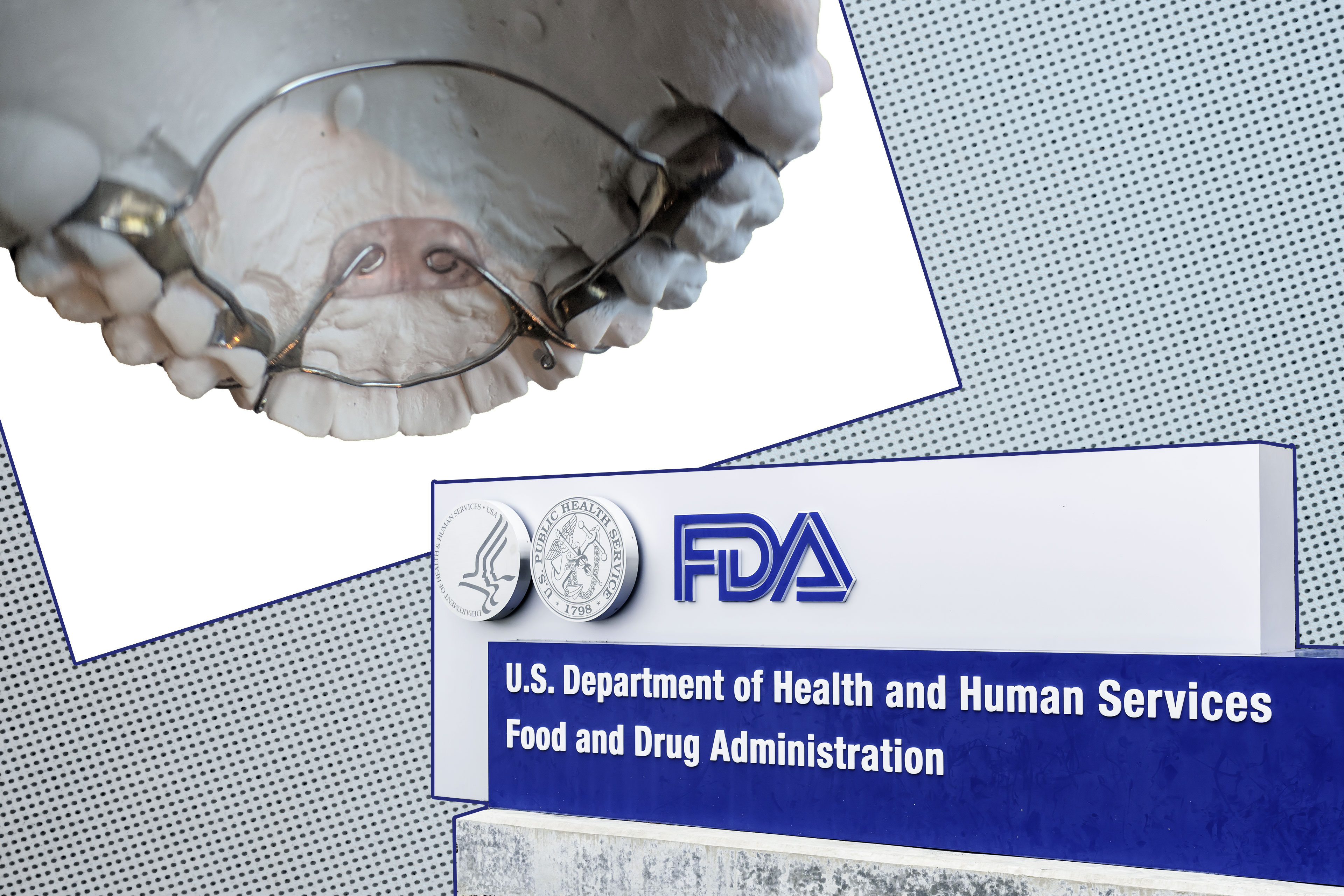This post was originally published on this site

In the wake of a KHN-CBS News investigation, the FDA on Thursday said it is “evaluating safety concerns” over the use of a dental appliance that multiple lawsuits allege caused grievous harm to patients.
The federal agency told the public in a “safety communication” posted on its website that it is looking not only at that product, the Anterior Growth Guidance Appliance, or AGGA, but other similar dental devices as well, including the Anterior Remodeling Appliance, or ARA, identified in a recent KHN and CBS News article.
The FDA said it is “aware of reports of serious complications with use of these devices” and asked that patients and health care providers report any complications experienced with them to the agency.
The agency said it is aware the devices have been used to treat conditions including sleep apnea and temporomandibular joint disorder of the jaw, also known as TMD or TMJ, but noted that “the safety and effectiveness of these devices intended for these uses have not been established.”
The AGGA device alone has been fitted on more than 10,000 dental patients, according to court records.
The KHN-CBS News investigation of the AGGA involved interviews with 11 patients who said they were hurt by the device — plus attorneys who said they represent or have represented at least 23 other patients — and dental specialists who said they’d examined patients who had experienced severe complications using the AGGA. The investigation found no record of the AGGA being registered with the FDA, despite the agency’s role in regulating medical and dental devices. The FDA confirmed Thursday that the devices “are not cleared or approved by the FDA.”
The AGGA’s inventor, Tennessee dentist Dr. Steve Galella, has said in a sworn court deposition that the AGGA was never submitted to the FDA, which he believes wouldn’t have jurisdiction over it.
At least 20 AGGA patients have in the past three years filed lawsuits against Galella and other defendants claiming the AGGA did not — and cannot — work. Plaintiffs allege that instead of expanding their jawbones, the AGGA left them with damaged gums, loose teeth, and eroded bone.
Additionally, KHN and CBS News reported that the Las Vegas Institute, a company that previously taught dentists to use the AGGA, now trains dentists to use another device its CEO has described as “almost exactly the same appliance.” That one is called the Anterior Remodeling Appliance, or ARA.
KHN and CBS News reached out Thursday to attorneys for Galella, the Las Vegas Institute, and the manufacturers of the AGGA and the ARA but received no immediate response.
Galella has declined to be interviewed by KHN and CBS News. His attorney, Alan Fumuso, previously said in a written statement that the AGGA “is safe and can achieve beneficial results.”
All the AGGA lawsuits are ongoing. Galella and the other defendants have denied liability in court filings. Cara Tenenbaum, a former senior policy adviser in the FDA’s device center, said reports of complications from these devices are of critical importance and can be submitted through FDA’s MedWatch portal.
“Whether that’s a dentist, an orthodontist, a surgeon, a patient, family member, or caregiver,” Tenenbaum said in a recent interview, “anyone can and should submit these reports so the FDA has a better understanding of what’s happening.”
In a court deposition, Galella said he personally used the AGGA on more than 600 patients and has for years trained other dentists how to use it. In video footage of one training session, produced in discovery in an AGGA lawsuit, Galella said the device puts pressure on a patient’s palate and causes an adult’s jaw to “remodel” forward, making them more attractive and “curing” common ailments, such as sleep apnea and TMJ.
“It’s OK to make a crapload of money,” Galella told dentists in the video. “You’re not ripping anybody off. You’re curing them. You’re helping them. You’re making their life totally beautiful forever and ever.”
In its Thursday announcement, the FDA said it is aware the devices have been used “to remodel the jaw in adults” but pointed out that devices like these called “fixed (non-removable) palatal expanders” are generally used on children and adolescents, “whose upper jaw bones are not yet fused.” By contrast, the FDA said, “an adult’s upper jaw bones are fused, and when a fixed palatal expansion device applies force, the palate is resistant to expansion. If forces are applied incorrectly to the teeth, serious complications can occur including chronic pain, tooth dislocation, flared teeth, uneven bite, difficulty eating, damaged gums, exposed roots, bone erosion, and tooth loss.”
Patients interviewed by KHN and CBS News described experiencing many of those problems. One patient who has sued, former professional clarinetist Boja Kragulj, said specialists later had to pull her four front teeth. She now wears false teeth.
Reached Thursday, Kragulj said: “While it’s too late for me and many others, there is some comfort in knowing the FDA is investigating the AGGA/ARA/ORA product and its claims. I hope other patients are spared the injuries and lost years that many of us have now suffered.”
The FDA said it plans “to investigate potential violations” in connection with the use of the devices, and that it is “identifying and contacting responsible entities to communicate [its] concerns.”
The American Dental Association, which has 159,000 dentist members, said it “will inform dentists of the FDA’s evaluation, and will continue to monitor for FDA updates regarding these devices and issues.”
This story was produced by KHN (Kaiser Health News), a national newsroom that produces in-depth journalism about health issues. Together with Policy Analysis and Polling, KHN is one of the three major operating programs at KFF (Kaiser Family Foundation). KFF is an endowed nonprofit organization providing information on health issues to the nation.